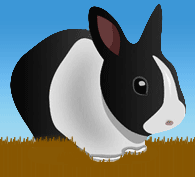



Welcome to Thumpers Hotel |
|
Rabbits have evolved to feed on a relatively low energy but high fibre diet, and as a consequence their teeth grow constantly. Dental disease is common in domesticated rabbits (but rare in farmed, commercial and wild rabbits), commonly as a result of : � congenital jaw abnormalities, � selective breeding for certain traits (e.g. a shortened muzzle), � an insufficiently fibrous and abrasive diet that would otherwise counter constant tooth growth � a diet low in calcium in young, growing rabbits that can cause osteoporosis of the jaw and loosening of the teeth Symptoms of dental disease often include: � Selective feeding of softer food, poor appetite or even anorexia � Weight-loss � Poorly formed stools or less frequent defecation � Poor grooming habits � Slobbers - drooling from the mouth over the chin, neck or front paws, and the saliva may be blood tinged if the tongue or cheek is cut by dental spurs � Facial abscesses or jaw bone infection � Secondary gut upsets such as bloat or gut stasis due to insufficient dietary fibre � Weeping or white purulent discharge from the eyes � Predisposition to fur mite infestation (secondary to impaired grooming) or fly-stike (secondary to soft stools or reduced caecotroph ingestion) � NB Rabbits do rarely vocalise when uncomfortable, and in all likelihood dental pain is just as uncomfortable for rabbits as it is in humans Realistically dental disease of rabbits can only be managed and may involve: � Regular burring of affected teeth, often every 4-6 weeks � Extraction of incisor teeth. Extraction of cheek teeth is difficult and generally not performed due to limited access, the fact that opposing teeth on the continue to grow unchecked, and because dental disease typically affects multiple teeth � Skull xrays can demonstrate the severity of the dental disease, the presence of jaw bone infections |